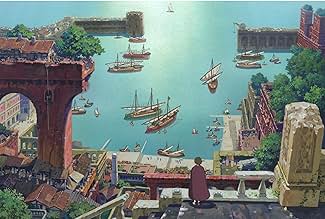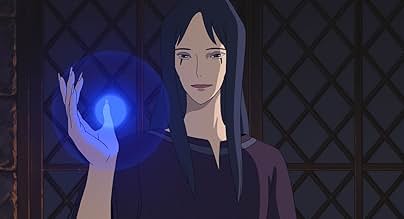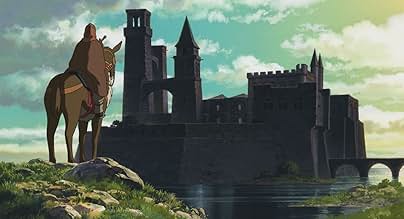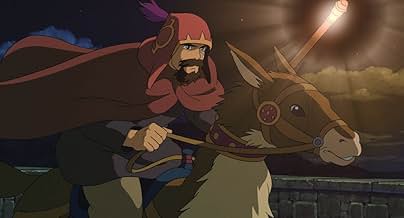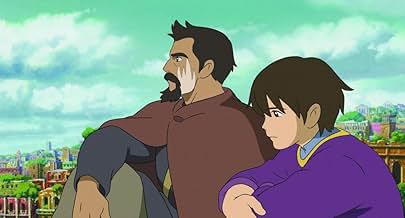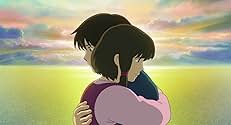NOTE IMDb
6,3/10
47 k
MA NOTE
Dans un pays imaginaire, un homme et un jeune garçon enquêtent sur une série d'évènements inhabituels.Dans un pays imaginaire, un homme et un jeune garçon enquêtent sur une série d'évènements inhabituels.Dans un pays imaginaire, un homme et un jeune garçon enquêtent sur une série d'évènements inhabituels.
- Réalisation
- Scénario
- Casting principal
- Récompenses
- 3 nominations au total
Timothy Dalton
- Sparrowhawk
- (English version)
- (voix)
Willem Dafoe
- Cob
- (English version)
- (voix)
Mariska Hargitay
- Tenar
- (English version)
- (voix)
Jun'ichi Okada
- Arren
- (voix)
Aoi Teshima
- Theru
- (voix)
Bunta Sugawara
- Haitaka
- (voix)
Yûko Tanaka
- Cob
- (voix)
Teruyuki Kagawa
- Hare
- (voix)
Jun Fubuki
- Tenar
- (voix)
Yui Natsukawa
- The Queen
- (voix)
Kaoru Kobayashi
- The King
- (voix)
Matt Levin
- Arren
- (English version)
- (voix)
Cheech Marin
- Hare
- (English version)
- (voix)
Blaire Restaneo
- Therru
- (English version)
- (voix)
Jeff Bennett
- Additional Voices
- (English version)
- (voix)
Susanne Blakeslee
- The Queen
- (English version)
- (voix)
- (as Suzanne Blakeslee)
Avis à la une
Watching Tales from Earthsea, I felt like I had been dropped off in the middle of a book series with no real context as to what was going on. I enjoyed the beautiful animation and ended up finding interest in the story and characters, but at the end of the film I still felt like I was missing something. Studio Ghibli probably should have set this one up better.
After watching this film I was pleased with the overall feel and look the production. Most notably I was impressed with the studio's visual creation of Earthsea. While the artistry and animation quality does not entirely measure up to other recent Ghibli studio films, I felt it did create a rich and colorful setting in which the story unfolds. A solid score also helps to shape the vibrant world that the movie conveys. However, I wouldn't consider all this to be a faithful representation of Ursula k. Le Guin's literary Earthsea, but rather something unique on to itself. One thing in particular that I think separates the film setting from that of the books' is the absence of the sea. I'm not saying its not there, just that it seems to mostly be in the background.
As for the story I don't think it stands out as anything great. It was limited from the start. The movie like the book is a single episode in a much larger tale. In no way could it possibly encompass the magnitude of the Earthsea series, let alone the main events in The Farthest Shore. It would simply be too much to present in a canvass of its length. As a result It lacks the epic feel of Princess Mononoke or the closure that comes at the end of Spirited Away. In other respects though, the film borrows heavily from Ghibli's previous works, mainly with the characters. They are shadows of former Ghibli creations, but due to their interaction and set of circumstances they retain some originality. I might also add that they come off as serious, and are far removed from the playful personalities that give other Ghibli films their charm. This said they still manage to play out their given roles and drive the story forward. From beginning to end the film holds up in large part because the setting never loses its feel.
I enjoyed this picture in spite of its flaws, again because of it's look and feel. For once I could see winged dragons clash and wizards face off in a Ghibli film. In my opinion Goro Miyazaki did a decent job bringing it all to life. At the same time, I hope he will learn from this experience and strive to do better next time. After my seeing Gedo Senki he has my support.
As for the story I don't think it stands out as anything great. It was limited from the start. The movie like the book is a single episode in a much larger tale. In no way could it possibly encompass the magnitude of the Earthsea series, let alone the main events in The Farthest Shore. It would simply be too much to present in a canvass of its length. As a result It lacks the epic feel of Princess Mononoke or the closure that comes at the end of Spirited Away. In other respects though, the film borrows heavily from Ghibli's previous works, mainly with the characters. They are shadows of former Ghibli creations, but due to their interaction and set of circumstances they retain some originality. I might also add that they come off as serious, and are far removed from the playful personalities that give other Ghibli films their charm. This said they still manage to play out their given roles and drive the story forward. From beginning to end the film holds up in large part because the setting never loses its feel.
I enjoyed this picture in spite of its flaws, again because of it's look and feel. For once I could see winged dragons clash and wizards face off in a Ghibli film. In my opinion Goro Miyazaki did a decent job bringing it all to life. At the same time, I hope he will learn from this experience and strive to do better next time. After my seeing Gedo Senki he has my support.
I've just come back from seeing this movie in the cinema. Being a devoted Studio Ghibli fan, going to see one of their movies on the big screen was an exciting event for which I had high expectations (I avoided reading any reviews). I am sorry to say that these were not met.
Having never read any of the books this film is based on, a lot of it didn't make any sense. Most of the concepts and character motivations are not given adequate exposition and a lot of things that you think will be resolved and explained as the movie goes on are never expanded upon (or indeed, resolved). Without giving anything away, the main character commits an outrageous action (especially for Ghibli heroes) at the start of the film, but the motivation for said action is not adequately expanded upon and he never really redeems himself (which makes it very difficult to engage with him for the rest of the film). It nearly felt like I was being punished for not being familiar with the source material.
The middle section is very slow moving, in fact nearly all of the action is to be seen at the beginning and towards the finale. Coupled with the lack of exposition on what's actually going on, it seemed like the film was just treading water, waiting for something interesting to happen (and in a 130 minute film, that's a bad thing!).
The ending, while being emotionally rousing and a spectacular set-piece, doesn't really make a lot of sense, as nearly all of the film focuses on a different protagonist than the one that eventually ends up saving the day.
Technically this film is not a patch on Spirited away, Howl's moving castle or Princess Mononoke, in fact the animation is more reminiscent of earlier Studio Ghibli films, such as Nausicaa (however these had wonderful stories to make them instant classics). The only thing that distinguishes it are the lighting effects, which are often superlative.
The music is great and very atmospheric.
Overall I'd have to say that it's worth watching when it comes out on TV, but not good enough to warrant making a trip to one of few cinemas showing it in the UK, or buying it full price on DVD, and this is something that I never thought I'd hear myself say as a die-hard (and now very disappointed) Studio Ghibli fan.
One final thing, this film has no sense of humour. The movie takes itself overwhelmingly serious with none of the "larger than life" magic that people have come to associate with Studio Ghibli.
Having never read any of the books this film is based on, a lot of it didn't make any sense. Most of the concepts and character motivations are not given adequate exposition and a lot of things that you think will be resolved and explained as the movie goes on are never expanded upon (or indeed, resolved). Without giving anything away, the main character commits an outrageous action (especially for Ghibli heroes) at the start of the film, but the motivation for said action is not adequately expanded upon and he never really redeems himself (which makes it very difficult to engage with him for the rest of the film). It nearly felt like I was being punished for not being familiar with the source material.
The middle section is very slow moving, in fact nearly all of the action is to be seen at the beginning and towards the finale. Coupled with the lack of exposition on what's actually going on, it seemed like the film was just treading water, waiting for something interesting to happen (and in a 130 minute film, that's a bad thing!).
The ending, while being emotionally rousing and a spectacular set-piece, doesn't really make a lot of sense, as nearly all of the film focuses on a different protagonist than the one that eventually ends up saving the day.
Technically this film is not a patch on Spirited away, Howl's moving castle or Princess Mononoke, in fact the animation is more reminiscent of earlier Studio Ghibli films, such as Nausicaa (however these had wonderful stories to make them instant classics). The only thing that distinguishes it are the lighting effects, which are often superlative.
The music is great and very atmospheric.
Overall I'd have to say that it's worth watching when it comes out on TV, but not good enough to warrant making a trip to one of few cinemas showing it in the UK, or buying it full price on DVD, and this is something that I never thought I'd hear myself say as a die-hard (and now very disappointed) Studio Ghibli fan.
One final thing, this film has no sense of humour. The movie takes itself overwhelmingly serious with none of the "larger than life" magic that people have come to associate with Studio Ghibli.
I am a great fan of the LeGuin books, and when I learned that Studio Ghibli was going to be involved in making of the film I eagerly looked forward to its release. I hoped it would make up for the awful SciFi Channel-aired film. The good news in this outing is, there is genuine respect for the source material, even if it is not done genuine honor.
The plot of the film is an amalgamation of elements of several of the Earthsea books, creating a new villain and having characters interact that indeed barely met in the books. While I could not help but feel disappointed by these changes, the film is still visually enjoyable to behold. It does not compare as favorably to Howl's Moving Castle, a story drastically altered from its own source material that still manages to stand on its own as a story.
I could not help but think, as I watched the character Arren develop, why? Why, when there is such wonderful source material, that his introduction came across so muddled and poorly reasoned. I viewed the film with someone who had never read the books, and she really enjoyed it. Despite the film's shortcomings, you generally care for the cast by the end.
The plot of the film is an amalgamation of elements of several of the Earthsea books, creating a new villain and having characters interact that indeed barely met in the books. While I could not help but feel disappointed by these changes, the film is still visually enjoyable to behold. It does not compare as favorably to Howl's Moving Castle, a story drastically altered from its own source material that still manages to stand on its own as a story.
I could not help but think, as I watched the character Arren develop, why? Why, when there is such wonderful source material, that his introduction came across so muddled and poorly reasoned. I viewed the film with someone who had never read the books, and she really enjoyed it. Despite the film's shortcomings, you generally care for the cast by the end.
Better than I expected, a fantastic debut from Goro Miyazaki (son of Hayao Miyazaki) and a worthy addition to Ghibli's consistently brilliant catalog. It follows the prince Arren, as he runs from his kingdom and encounters a wizard named Ged. From here, he is drawn into a classic good versus evil battle. Goro Miyazaki's film bares a lot of similarities to his father's films, but lacks some of the whimsical nature that makes Hayao's movies so distinct. Tales from Earthsea is a more subdued film than films such as Spirited Away and Porco Rosso, and doesn't really hit the emotional or imaginative heights that Hayao Miyazaki's films do. But this isn't always a bad thing - It's simply Goro's style, and this element makes his film a more traditional, perhaps more sensible narrative. Goro has taken a somewhat conservative route with this film - visually and audibly it's classic Ghibli, full of lush environments and excellent animation. In terms of narrative, it carries classic Ghibli (particularly Miyazaki) hallmarks - epic battles of good and evil, cathartic journeys, and the hospitality and grace of ordinary people - but it also has more of a traditional narrative. Good and evil are, unlike many his father's films, clearly defined, and the events of the film lack the extravagance (and imagination) of Hayao's films. It's a wise move - rather than try to re-invent the wheel, Goro has made a wonderfully solid and cohesive film.
To simply compare Goro Miyazaki (and his film) to his father is unfair and sells a great movie short - he has obviously inherited a tremendous flair for storytelling, and with Ghibli's animation team behind him, has created a fantastic debut film. There's another Miyazaki in town - and i can't wait to see where he goes next.
To simply compare Goro Miyazaki (and his film) to his father is unfair and sells a great movie short - he has obviously inherited a tremendous flair for storytelling, and with Ghibli's animation team behind him, has created a fantastic debut film. There's another Miyazaki in town - and i can't wait to see where he goes next.
Le saviez-vous
- AnecdotesHayao Miyazaki first wrote to author Ursula K. Le Guin about adapting her book into a film. LeGuin at the time was unfamiliar with Miyazaki's work, and associated animation to be similar to Disney animation, and turned the offer down. After she saw Mon voisin Totoro (1988), she loved it, and decided to allow the movie to be made.
- Citations
Haitaka: Now listen to me, Aaren: No man nor any living thing in this world preserves their life forever. But only to men is it given to know that we must die, and that is a precious gift. This life that is both our torment and our treasure was never meant to endure for eternity. Life is a wave on the sea. Would you force the sea to grow still to save one wave? To save yourself?
- ConnexionsFeatured in New York, I Love You (2008)
- Bandes originalesSong of Time
Lyrics by Akino Arai and Gorô Miyazaki and music by Akino Arai and Hisaaki Hogari
Performed by Aoi Teshima
Meilleurs choix
Connectez-vous pour évaluer et suivre la liste de favoris afin de recevoir des recommandations personnalisées
- How long is Tales from Earthsea?Alimenté par Alexa
Détails
Box-office
- Montant brut aux États-Unis et au Canada
- 48 658 $US
- Week-end de sortie aux États-Unis et au Canada
- 20 614 $US
- 15 août 2010
- Montant brut mondial
- 68 728 059 $US
- Durée
- 1h 55min(115 min)
- Couleur
- Mixage
- Rapport de forme
- 1.85 : 1
Contribuer à cette page
Suggérer une modification ou ajouter du contenu manquant




